| | The US strikes a boat allegedly carrying drugs in the Pacific, Japan changes its stance on the morni͏ ͏ ͏ ͏ ͏ ͏ |
| |  | Flagship |  |
| |
|
The World Today | 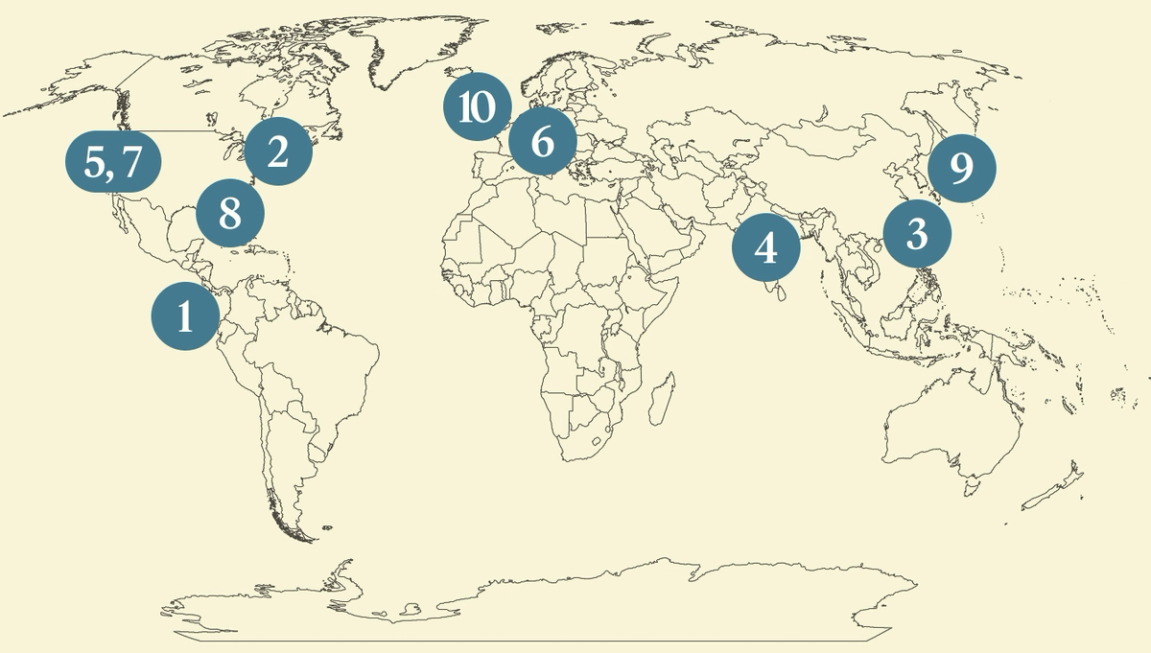 - US expands ‘drug boat’ strikes
- ICE targets New York City
- Trump’s rare Taiwan comment
- India still close with Russia
- Anti-superintelligence push
- Bubbles, bubbles everywhere
- Booming disaster business
- Florida’s ‘Death Train’
- Morning-after pill in Japan
- London restaurants’ side hustle
 A citywide (artistic) séance in Seoul, and Semafor’s tech editor on the AI browser showdown. |
|
US strikes alleged drug boat in Pacific |
 @SecWar/X @SecWar/XThe US struck a boat suspected of carrying drugs in the Pacific Ocean, marking an expansion of the White House’s deadly military campaign aimed at curbing drug trafficking. Tuesday night’s attack, the eighth such strike, killed two people, and comes as President Donald Trump “beats the drums of war for direct action in Venezuela,” The Washington Post wrote. The operations mark a win for US Secretary of State Marco Rubio — whose aggressive stance won out over diplomatic alternatives — as well as Trump adviser Stephen Miller, an immigration hardliner who sees the strikes as a way to expand the president’s power, reinforce a negative narrative of Venezuelans, and wage an “open-ended war on drugs and crime,” The New Yorker wrote. |
|
NYC Canal St. immigration raid |
 Michael Nigro/Sipa USA via Reuters Michael Nigro/Sipa USA via ReutersA chaotic immigration raid in New York City on Tuesday reflected the US government’s widening deportation campaign, drawing outrage from local officials and residents. Federal authorities said they arrested nine men who were in the country illegally, mostly from West Africa, around Canal Street — an area in Manhattan popular among tourists looking for fake luxury goods sold illegally on the sidewalks. As the White House pursues immigration crackdowns in Democrat-run cities, viral videos made by some pro-Trump influencers recently drew attention to the Canal Street vendors, and local businesses have called for more police presence there. The raid could come up during the city’s final mayoral debate on Wednesday; frontrunner Zohran Mamdani condemned the operation as “authoritarian theatrics.” |
|
Scrutiny over Trump Taiwan claim |
 Jonathan Ernst/Reuters Jonathan Ernst/ReutersUS President Donald Trump’s comment this week saying Beijing “doesn’t want” to invade Taiwan offered a rare glimpse into his thinking on the self-governed island’s future ahead of his planned meeting with China’s Xi Jinping. Analysts raised concerns about Trump’s “sunny optimism” about China’s intentions — Beijing sees Taiwan as a breakaway province it will eventually absorb, by force if necessary — and one expert criticized his “misplaced confidence” about the US’ military supremacy over China. Xi could pressure Washington into reducing support for Taiwan in exchange for trade incentives, but accepting such a deal “would be a grave mistake” that could destabilize the region, Foreign Affairs argued. |
|
India’s ties to Russia grow |
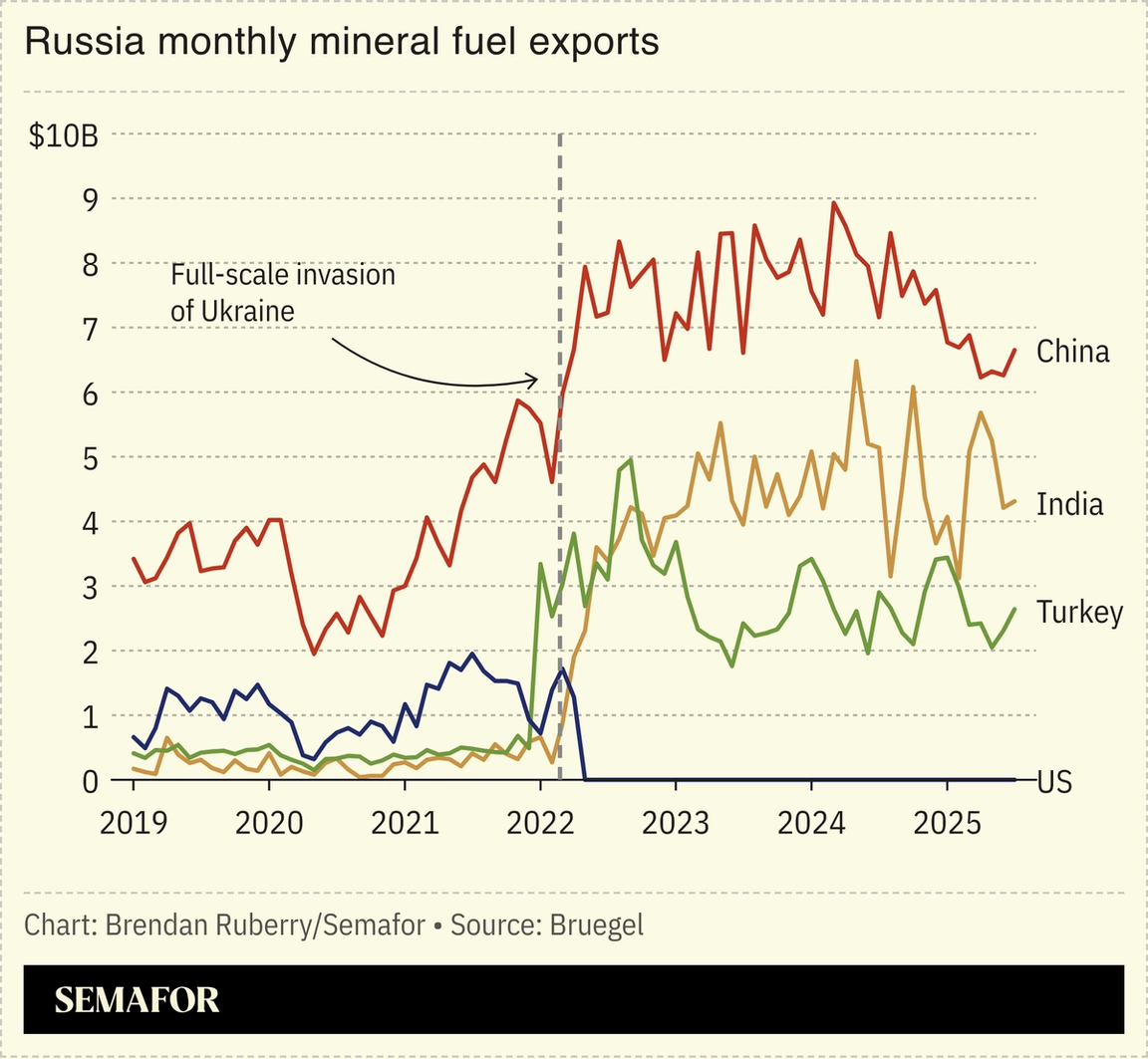 India is unlikely to stop purchasing Russian oil, analysts said, despite US President Donald Trump’s insistence to the contrary. Trump on Tuesday claimed India would halt its energy trade with Russia over the Ukraine war — his fourth such assertion in a week, per the Hindustan Times. But New Delhi hasn’t confirmed such a shift — Trump’s statements are likely pressure tactics over trade negotiations “rather than a reflection of an imminent policy change,” commodity intelligence firm Kpler wrote; Russia remains “deeply embedded” in India’s energy system. New Delhi is boosting economic ties to the Kremlin in other realms with reported plans to buy Russian missiles, while its exports to Moscow are “steadily widening in scope,” The Economic Times wrote. |
|
New call to stop superintelligence |
 Eduardo Munoz/Eric Gaillard/Brendan McDermid/Reuters Eduardo Munoz/Eric Gaillard/Brendan McDermid/ReutersHundreds of public figures across the ideological spectrum called for a ban on research that could lead to so-called “superintelligence,” a hypothetical stage of AI that outperforms the best human minds. Prince Harry, rapper Will.i.am, and Donald Trump’s former aide Steve Bannon were among those who signed the petition, which was organized by the Future of Life Institute. The same group circulated a widely publicized letter in March 2023 pushing for a six-month halt on AI training, a call that Silicon Valley did not heed. Even as Trump embraces AI to troll opponents online, some of his ardent supporters on the far right, like Bannon, have signaled growing unease toward the tech. |
|
Bubble watch: Fears extend beyond AI |
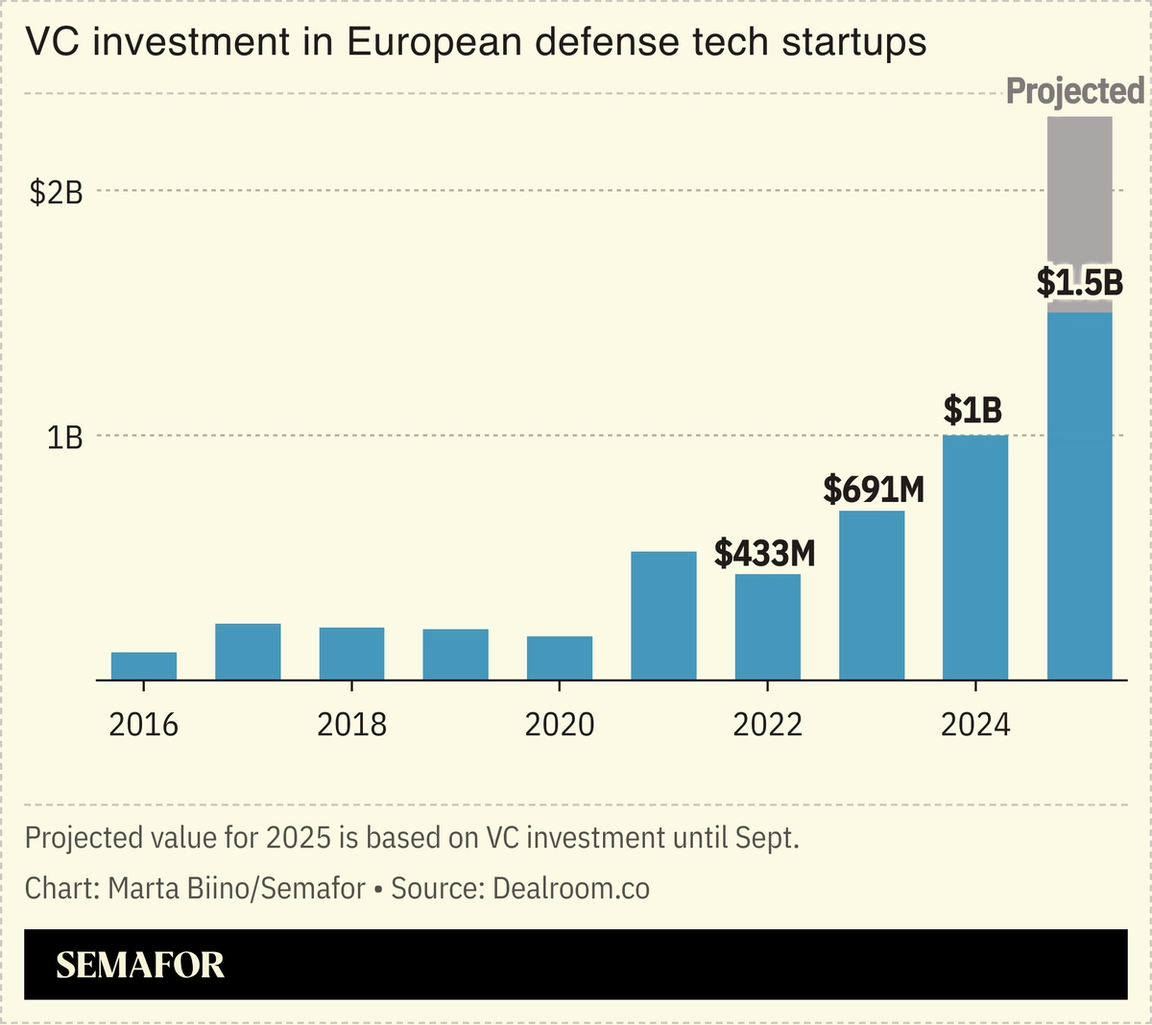 It’s not just AI: Analysts are warning of potential bubbles across markets. “Bubble talk has broken confinement,” a Financial Times columnist wrote, after the IMF invoked “the risk of sharp corrections” as markets appear “complacent as the ground shifts.” A German military software executive cautioned over a European defense tech bubble, while Transformer wrote that Silicon Valley is discussing the “when,” not “if” of an AI crash. Looking at earlier bubbles, however, such as the 1840s British railway craze, the eventual crash hurt investors but resulted in a thriving train network. Economist Noah Smith similarly noted the US housing bubble of the 2000s built many homes the country needed, even if it triggered a financial crisis. |
|
The business of disaster recovery |
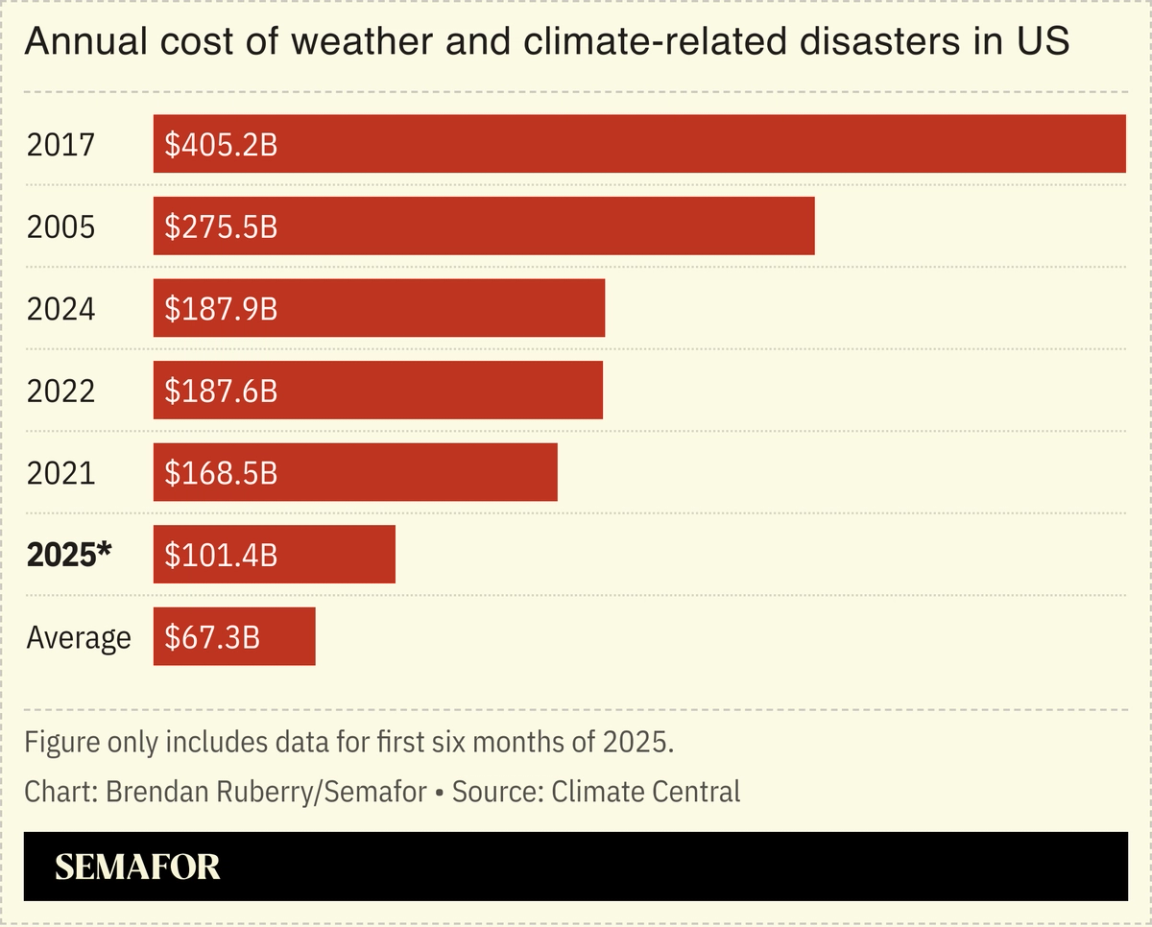 The first half of 2025 was the costliest on record for weather disasters in the US, new figures show, with damages surpassing $100 billion. The bulk of that total stemmed from punishing wildfires in California. As climate change makes extreme weather more common, disaster recovery is becoming a powerful economic driver. Some 36% of US GDP growth since 2000 stemmed from disaster relief, Bloomberg wrote, as more money flows to insurers, waste haulers, engineering contractors, hardware stores, and storage facilities: “These are good businesses to be in in challenging times.” |
|
‘Death Train’ reflects US rail woes |
 Marco Bello/Reuters Marco Bello/ReutersA privately owned high-speed rail line in Florida was hailed as a new model for US mass transit, but an alarming number of deaths along its path underscores the country’s train woes. The Brightline, which runs between Miami and Orlando, has been nicknamed the “Death Train” because it has been involved in at least 185 fatalities since it began operating in late 2017. Brightline has a high number of roadway crossings, The Atlantic wrote; local governments haven’t built infrastructure to route cars over or under the tracks. One analyst told Vox the state of US high-speed rail is “nonexistent and terrible,” pointing to overregulation that hinders big projects, even as Europe, Japan, China, and Mexico rapidly expand. |
|
Japan changes stance on morning-after pill |
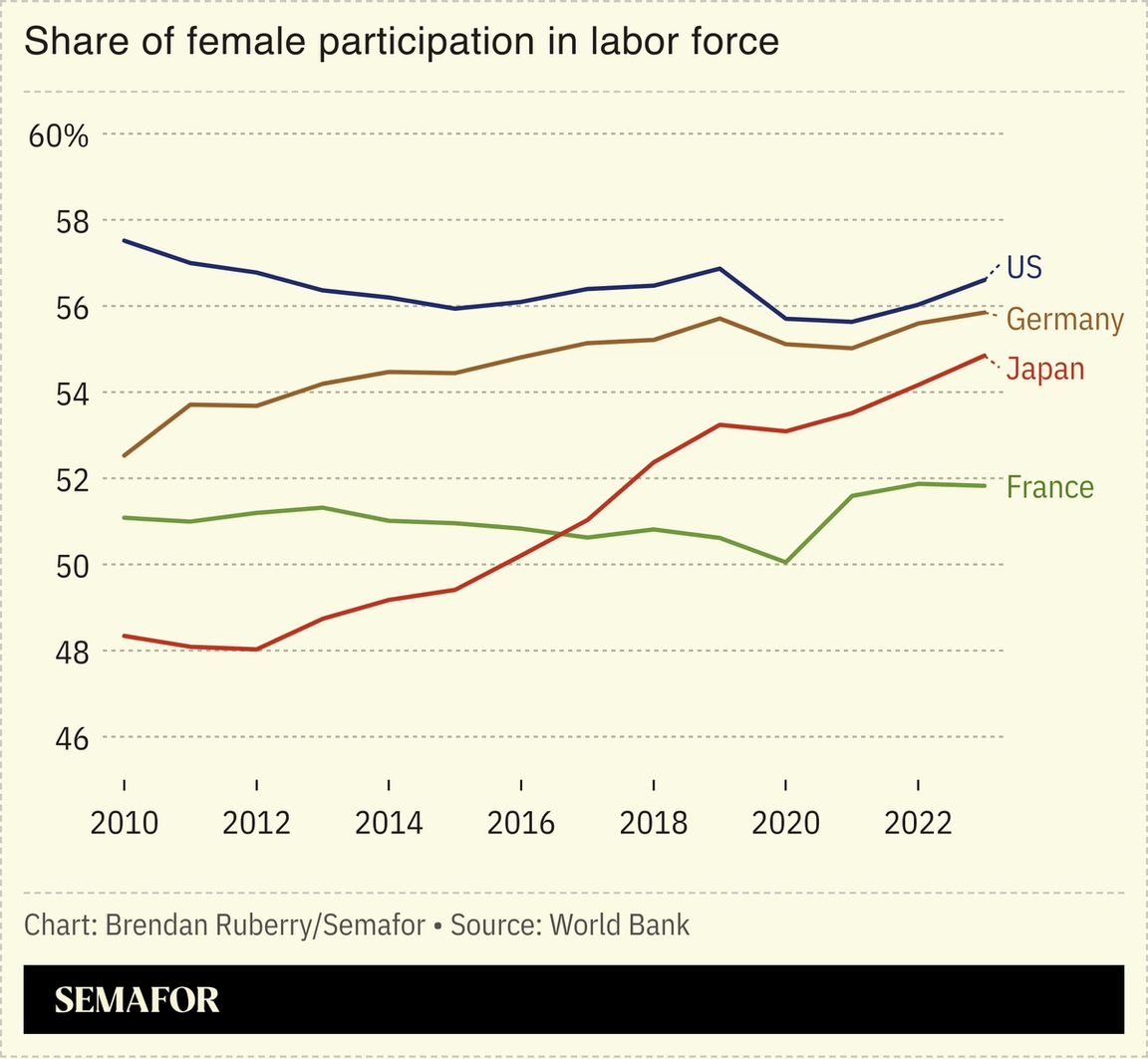 Japan will make the morning-after pill available over the counter for the first time. Emergency post-coital contraception has been available in pharmacies in most developed countries for decades. But in Japan, women still required a doctor’s examination and prescription to obtain it, creating significant barriers to access, especially for younger women and rape survivors. Japan has been slower to adopt female reproductive healthcare treatments than comparable countries, the BBC reported, with campaigners blaming conservative views about women’s roles. In 1999, a controversy erupted when Viagra was approved within six months of being patented, while the contraceptive pill remained off limits after 30 years even though every other industrialized country had approved it. |
|
From ghost kitchens to host kitchens |
 Isabel Infantes/Reuters Isabel Infantes/ReutersLondon’s neighborhood restaurants are running side hustles, cooking delivery food for more established brands. Orders from Gourmet Burger Kitchen, Coqfighter, and other well-known chains are being made in local takeaways — “Chinese restaurants churning out American barbecue, fried chicken coming from kebab shops and Mexican meals from pizza outlets,” London Centric reported. Previously, delivery services like Deliveroo and UberEats used “ghost kitchens,” usually shipping containers in car parks. They are unpopular with residents, though, so the services have turned to “host kitchens,” employing the facilities and staff of existing restaurants, so the brands can reach every suburb. “If it arrives hot and it’s all the same… people don’t actually mind where it comes from,” one company behind the trend said. |
|
|